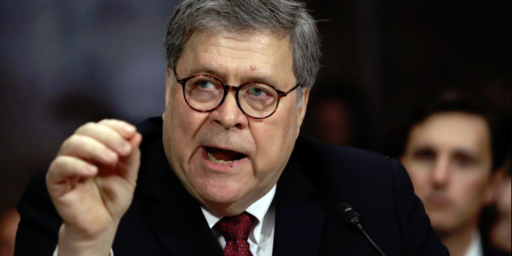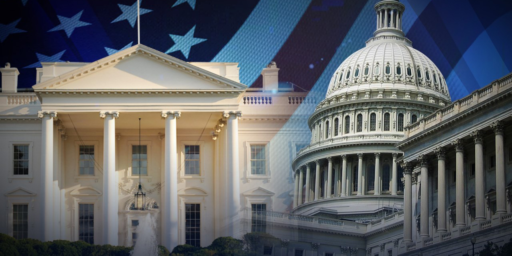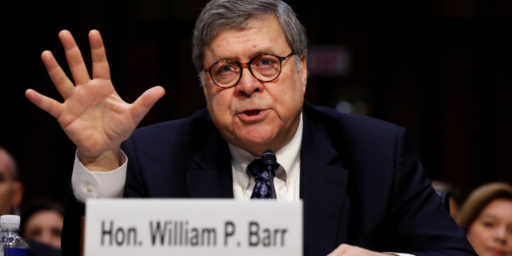House Judiciary Committee Votes To Hold Attorney General Barr In Contempt
As expected, the House Judiciary Committee voted yesterday on party lines to hold Attorney General William Barr in contempt for refusing to turn over a full copy of the Mueller Report

As expected, the Democratic majority on the House Judiciary Committee has voted to hold Attorney General William Barr in contempt for refusing to turn over an unredacted copy of the report of Special Counsel Robert Mueller to Congress:
WASHINGTON — The House Judiciary Committee voted Wednesday to recommend the House hold Attorney General William P. Barr in contempt of Congress for failing to turn over Robert S. Mueller III’s unredacted report, hours after President Trump asserted executive privilege to shield the full report and underlying evidence from public view.
The committee’s 24-16 contempt vote, taken after hours of debate that featured apocalyptic language about the future of American democracy, marked the first time that the House has taken official action to punish a government official or witness amid a standoff between the legislative and executive branch. The Justice Department decried it as an unnecessary and overwrought reaction designed to stoke a fight.
The drama raised the stakes yet again in an increasingly tense battle over evidence and witnesses as Democrats investigate Mr. Trump and his administration. By the day’s end, it seemed all but inevitable that the competing claims would have to be settled in the nation’s courts rather than on Capitol Hill, as Democrats had initially hoped after the initial delivery of Mr. Mueller’s report.
“Our fight is not just about the Mueller Report — although we must have access to the Mueller report. Our fight is about defending the rights of Congress, as an independent branch, to hold the president, any president, accountable,” said Representative Jerrold Nadler of New York, the Judiciary Committee chairman, during a grueling debate that ended with a vote along party lines.
(…)
Lawmakers convened a little after 10 a.m. Wednesday to formally draft and vote on the committee’s 27-page contempt report. The document lays out the committee’s need for the report and offers an accounting of attempts to get Mr. Barr to share the materials first voluntarily and then under subpoena.
“Although the committee has attempted to engage in accommodations with Attorney General Barr for several months, it can no longer afford to delay, and must resort to contempt proceedings,” the report reads.
The Justice Department had tried to stave off the committee vote, offering to lawmakers some concessions around a less redacted version of the Mueller report that Democrats ultimately deemed insufficient.
Complying with the subpoena, Mr. Boyd wrote, would require the department to violate “the law, court rules, and court orders” as well as grand jury secrecy rules. Republicans in the Judiciary Committee hearing room returned to that point again and again as they accused Democrats of putting Mr. Barr in an untenable situation of choosing between their subpoena and the law.Democrats said they did not expect Mr. Barr to break the law and unilaterally release grand jury secrets. Rather, they said they had repeatedly asked him to join the committee in petitioning a judge to unseal material for the grand jury for committee use. He refused. Democrats agreed to an amendment from Representative Matt Gaetz, Republican of Florida, that clarified the committee did not expect Mr. Barr to break the law and unilaterally release the grand jury material.
Democrats view the president’s privilege claim as bunk, since much of the report and evidence have either been released publicly or shared with lawyers in the special counsel case.Still, Mr. Trump’s invoking of privilege for the first time as president could tie up the material in court and significantly complicate Democrats’ efforts to call other witnesses. Mr. Nadler said Wednesday it could delay a potential hearing with Mr. Mueller himself in the Judiciary Committee. And it could also limit testimony by Donald F. McGahn II, a former White House counsel and key witness in the special counsel’s investigation, scheduled under subpoena for May 21.
The dispute with the Justice Department generally and Barr in particular centers around the delays that have been encountered in the Justice Department’s response to demands for an un-redacted copy of the report of Special Counsel Robert Mueller. There are also ongoing disputes regarding subpoenas for other documents related to the Russia probe sent to both the Justice Department and the White House. So far at least, the Administration has sought to obstruct those subpoenas and refuse to provide the documents in question, a move that sets up the probability of a court battle between the House and the White House over document production, a legal fight that could last well into the 2020 election cycle and which would likely eventually have to be resolved by the Supreme Court. The most recent development in the matter came just hours before yesterday’s committee vote when the Trump Administration officially invoked Executive Privilege with respect to providing a full copy of the Mueller report. As I explained in my post yesterday, while there may be some parts of the full Mueller Report that should properly remain confidential, the idea that the entire report is covered by Executive Privilege seems dubious at best.
This is only the second time in American history that a Congressional Committee has held a Cabinet member in contempt. The first time occurred seven years ago when the House Oversight Committee voted to hold then Attorney General Eric Holder in contempt for his alleged failure to provide documents related to the so-called “Fast & Furious” investigation. That vote was quickly followed up by a vote by the full House of Representatives to do the same which, like the Committee vote, fell largely on party lines. After the House vote, the matter was referred to the Justice Department, which of course declined to act on the matter. This led the House to file a civil contempt proceeding in U.S. District Court in Washington which essentially died when Holder left office after 2012 election. Interestingly enough, the Obama Administration also attempted to use Executive Privilege to prevent a contempt citation in that case.
It’s expected that the process will unfold in a similar manner in the Barr case. The Committee vote will obviously be on party lines, and it’s expected that the full Democratic-controlled House will endorse the contempt citation. The matter will then be forwarded to the Trump Justice Department, which will essentially be asked by the House of Representatives to pursue a case against its own Attorney General. That will most likely not happen, and the matter will then be back in the House’s court.
At that point, the House will have two options.
One option would be to file a civil suit to hold Barr in contempt as the Republicans did in 2012. This would leave the matter up to a Federal Judge but would preclude the possibility of criminal prosecution. This civil lawsuit would also likely be tied up in Federal Court for years.
The House’s second option is the more radical one. If the full House votes to hold Barr in contempt, then the House would have the authority under its own “inherent contempt” powers to order the House Sergeant At Arms to arrest Barr and imprison him until he purges himself of the contempt. Contrary to some reports there is not really a jail in the U.S. Capitol that could be used for this purpose, so it seems likely that the House would transfer custody to the Federal Bureau of Prisons, which would mean that Barr would likely be jailed either in the District or in the jail for the City of Alexandria, Virginia, which often takes custody of federal prisoner being held before trial or in contempt situations. This avenue of enforcement has not been pursued very much in recent times, though, and the odds that the House will choose this option seem rather low.
As noted above, the most common outcome in these types of cases is for the dispute between the Executive and Legislative Branches to end up being resolved in the end. Perhaps that will happen here, but given the way things have gone between the two parties since the start of the Obama Administration, it’s also entirely likely that neither side will be willing to blink and we’ll be headed to Court. An additional factor is the fact that the President himself does not appear willing to comply with Congressional subpoena’s regarding the Mueller report or any other issue that is currently being investigated regarding his Administration. This sets the stage for an epic showdown in the Courts in the coming months between the two branches over the scope of Congressional investigatory and oversight authority.
Here’s the committee’s report on holding Barr in contempt:
Report of House Judiciary C… by on Scribd






In sensible times, yes I’d agree with this. Imprisonment is the drastic option but unfortunately this Administration keeps push to the point where drastic is on the table. Trump and Co insist on breaking norms so why not this one? The reasonable action of court procedures means time bought for Trump to continue his damaging actions. What’s more, our norms and customs are taking a huge hit from this kind of behavior. When an Administration is so blatantly disrespectful of a co-equal branch’s authority and powers, it’s well within reason to firmly reassert that to re-gain respect. Frankly, if Obama and Co had done this, Congress would have been arresting people left and right so Trump’s only getting the benefit of IOIYAR. I’m not opposed to Congress exercising this power against an increasingly-imperial Presidency regardless of who’s in power. They need to start taking back their agency and acting like the Founders intended – the source of law and authority in this nation that the President exists to put into action, not the other way around.
How much rope are you obligated to you give someone before they hang themselves? Barr’s the one doing this to himself with his behavior. He wants to keep it up in defense of his master? Then welcome jail since that’s how a lot of Trumpkins end up. Bad life choices usually end badly.
What is particularly queer about all this is that it is generated by a Republican party that ostensibly is always paranoid about Imperial Presidencies and supposedly jealous of centralised power.
@Lounsbury: As KM mentioned, Republicans usually say one thing and do another. Their principles are very situational. It’s okay if you’re a Republican, and it’s NOT okay if you’re not a Republican.
I know this is wishful thinking, but I think the time has come for the more radical option. The Trump administration has been blatantly thumbing its nose at the entire idea of congressional oversight by the opposing party. Someone, especially “snitty” AG Barr, might find some perspective after cooling their heels in a real live jail cell for a time.
Of course, this wouldn’t be so wishful if even one Republican voted in favor of contempt. I’m really finding it hard to believe that no one representing the GOP in Congress can see the horrible precedent being set here. They are fools if they think Trump’s maximal obstructions won’t be used against them the next time there’s a Dem in the WH and the GOP holds the House.
@KM:
Another norm is that the Justice Dept. won’t indict a sitting president, or in this case Trump.
Norms can be changed with relative ease. So I propose this one:
If the Justice Department has sufficient reason to bring an indictment against a sitting president, in particular for actions undertaken during their time in office, then they should send a letter to the VP, Congress, and the cabinet, asking them to initiate 25th amendment proceedings to remove the president from office so the indictment can proceed.
IMO, this would be better than the current policy, as now it turns a straightforward criminal matter into a political one. It would also lay bare the accusation against the president, rather than making that into a political matter as well. It’s also better than naming them an unidicted co-conspirator.
There are drawbacks, to be sure. the biggest one is that future presidents would have every incentive to tightly rein in the DOJ, killing its independence. That would open the door for using the DOJ, and dependent agencies like the FBI, as political tools. Say by launching investigations or outright fake prosecutions of political opponents, or for that matter of candidates for any office.
So you want to be careful.
Interesting. The House Dems hope to win by holding the AG in contempt of Congress because he refuses to violate the laws of the United States and/or he, a member of the co-equal Executive branch, chooses not to support the House Democrat petition to release the redacted information from being withheld in accordance with the laws of the United States.
All this so the Dems can crow “What is Trump hiding?”, when the matter has been fully investigated in accordance with the Special Counsel law and the lightly redacted report has, at the discretion of the AG, been released for public inspection. Whereas, the underlying investigation’s developed facts and testimony was obviously intended to be restricted from Congress by the passage of the Special Counsel law back in ’99.
Upside, it revives the Obama administration activities in ‘Fast and Furious’ which in the light of the now known efforts by Obama to use federal law enforcement agencies for political purposes, highlights that this ostensively BATF “sting” was more likely a gunrunning operation to transfer US guns to Mexican cartels so subsequent “discovery” of those guns could be used as a political premise for gun control laws against US citizens across the country. And the Obama “wingman” AG whose contempt of Congress was for the purpose to cover up this collusion against the US Constitution.
I wonder which meme will win the most votes?
@Kathy:
Activation of the 25th amendment would negate any indictment as the 25th can only be used if the President is incapacitated and cannot continue in his duties. Incapacitation would prevent prosecution as by definition the president couldn’t participate in their own defense. And upon recovery, the President can challenge the removal and be returned to office.
If you really think the president has done something criminal, then they can indict under seal, i.e., locked up and not discussed publicly, while in office, and then proceed after the president has left office.
I think everyone should take the time to revisit the three OTB posts, and comments, from 2012 that Doug linked to from when Eric Holder was held in contempt for refusing to turn over documents related to Fast and Furious after citing executive privilege.
Lots of interesting arguments for and against that decision.
https://www.outsidethebeltway.com/white-house-asserts-executive-privilege-over-fast-and-furious-documents/
https://www.outsidethebeltway.com/house-oversight-committee-to-file-contempt-suit-against-eric-holder/
https://www.outsidethebeltway.com/house-oversight-committee-holds-eric-holder-in-contempt/
Use the inherent contempt power. Lock him up. This is just what that was made for.
And we need to change DOJ policy regarding indicting presidents in office. It should be that whenever there is evidence the president committed a crime, he needs to be suspended, have the VP immediately become Acting President, and a formal investigation — complete with impeachment and ouster if necessary — must be undertaken.
Enough is enough.
@KM:
Politically, I think this would play out poorly. Certainly for anything short of failure to appear.
@mattbernius:
Very interesting indeed. This comment in particular, from our resident legal expert JKB, was particularly interesting:
Just a bit more interesting than this comment, also from JKB:
Of course, Trump claims he had no involvement with anything Russian. I wonder what JKB thinks about asserting Executive Privilege when the President is claiming he wasn’t involved in anyway with the subject of the investigation. Oh wait, he helps us with this as well:
and
‘
The other thing that surprised me about those threads is that Drew/Guarneri used to actually engage in dialogue, instead of throwing up a “haha the libtards are triggered” comment and then skedaddling, as has been his MO since Trump’s election.
@Neil J Hudelson:
I’m glad to see I wasn’t the only one who noticed some potential inconsistencies that have emerged in the intervening years. But hey, I’m sure there will be a ton of reasons why that thinking only applied to Obama and Holder and that this situations is completely and totally different.
Though, for the sake of consistency, the entire obstruction component of the report was very clearly involving the President directly ordering key immediate staff members to fire Mueller.
@Jeremy:
In some countries, the president or prime minister, legislators, sitting judges, governors, mayors, and often others, enjoy a kind of immunity from prosecution while in office, but this can be removed, usually by one or both legislative chambers.
In America, a law could be passed requiring the DOJ, or a state’s attorney, or a district attorney, to submit an indictment for approval to the House, which would then vote on whether or not the president can be indicted, passed on a simple majority.
I think it ought to be the House alone, because it is the more representative body.
If the indictment isn’t approved, then the DOJ or other relevant authority can bring it up again after the president leaves office, and on the meantime the statute of limitations is paused.
This, IMO, signals firmly the president is not above the law, at any level, that the law is not a political matter, and lets law enforcement agencies clearly declare everyone a criminal suspect without involving politics.
This exception from indictment just because a president can be removed from office is wrong. it ties up the law too closely to politics, even after a president leaves office. Impeachment and removal are not meant to be criminal remedies, or the only justice available to a president. If civil suits against a sitting president can proceed, then so can criminal indictments. the claim that this would distract the president too much and render them less capable of performing the duties of their office is valid, but not relevant. An indictment can render the CEO of a firm less capable of doing their job, likewise a judge, a Senator, a mayor, a doctor, a teacher,a governor, etc. Yet such people can be indicted at any time, because they’re not above the law. The president shouldn’t be above the law either, nor anyone should treat them as though they are.
“In America, a law could be passed requiring the DOJ, or a state’s attorney, or a district attorney, to submit an indictment for approval to the House, which would then vote on whether or not the president can be indicted, passed on a simple majority.”
Our system is already fully politicized, so this kind of solution may already be both:
–a day late and a dollar short and
–subject to the same types of corruptions that we already have because of the extreme politicization of our system.
@just nutha:
Oh, no. It’s far later than that.
Yes. Absolutely. No question. I agree completely.
But the indictment’s text and the charges would be out in the open for all to see. And prosecution could take place once the president leaves office. While this is true a tall times, it would be far more certain to occur if the charges were known and an indictment produced.
@mattbernius: Oh wow that takes me back. I didn’t post nearly as often back then and I can’t help but notice your name was a little different 😛
@Neil J Hudelson:
Of course, what you ignore is that ‘Fast and Furious’ was a DoJ operation and had not be subjected to an independent investigation. Attorney General Holder was directly implicated and so sought to obstruct the oversight investigation.
Contrast that to the current “crisis” in which an Special Counsel investigated independently in the manner envisioned by Congress when they enacted the Special Counsel law, that is to remove the partisan Congress from the mix in all but receipt of a report of prosecutions and declination of prosecutions.
In any case, the Congress has the power to pass a modification to Rule 6e. which outline the exceptions when grand jury information can be disclosed, to permit Special Counsel investigatory material to be released to Congress. Until then AG Barr is following the laws enacted by Congress.
Someone brought this up to me the other day – those Russians that Director Mueller had charged; what’s up with that? Is he just going to let that go?
https://thehill.com/opinion/judiciary/442732-democrats-showing-contempt-by-holding-william-barr-in-contempt
Not that logic and perspective matter to any of you.
@mattbernius: Quite a trip down memory lane. Superdestroyer even shows up on one of those threads for a rare, not-racist comment.
I miss superdestroyer. Sure, he was racist, but he wasn’t changing his beliefs every thirty seconds to defend whatever his side needed to defend, he wasn’t just popping in to be spiteful or snarky, he was genuine and earnest as can be. He earnestly believed amazingly offensive and horrible things, which is bad, but that earnestness was refreshing.
I hope he turned out all right in the end, despite every likelihood that he did not.